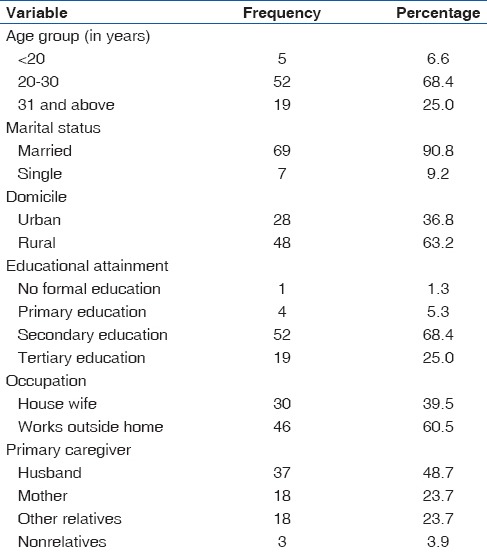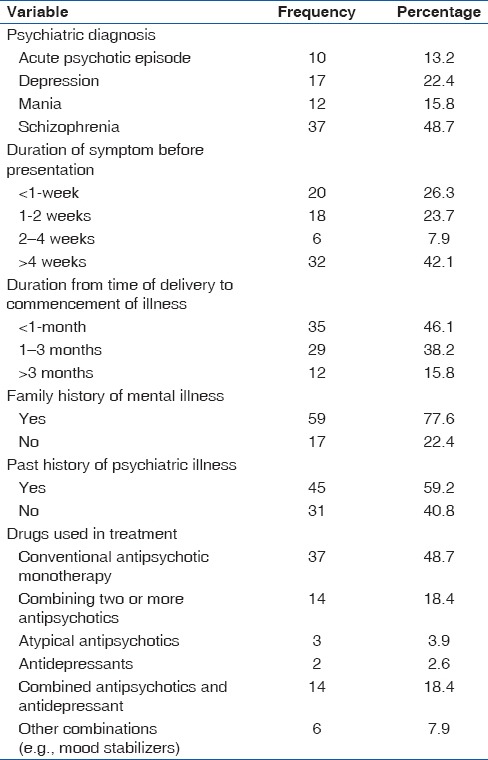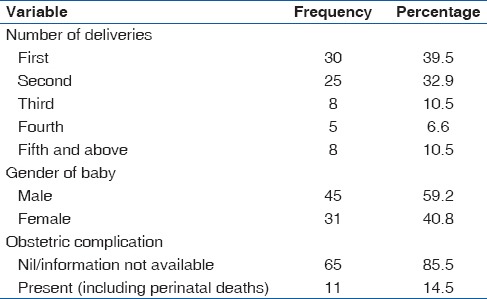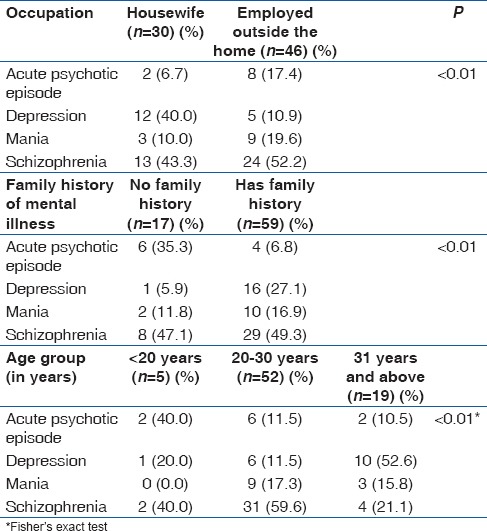Abstract
Background:
Pregnancy and labor in areas with high maternal morbidities as in Nigeria could be sufficiently stressful to precipitate mental disorders in women after delivery, which may be a new or a relapse of previously existing one, or an exacerbation of an attenuated mental illness in the nursing mother. Mental illness in a nursing mother, if not treated may result in impaired mother-infant relationship.
Aim:
To determine the clinical and socio-demographic characteristics of women diagnosed with postpartum psychiatric conditions in a tertiary mental health facility of a developing country.
Subjects and Methods:
A retrospective case note reviews of 76 women diagnosed with postpartum psychiatric conditions for the first time in the Federal Neuropsychiatric Hospital Enugu between January 2009 and December 2011.
Results:
The mean age of the women was 27.76 years, with 63% (48/76) of them coming from the rural areas. 93% (71/76) of them had at least a secondary education and 78% (59/76) of the women had a family history of psychiatric disorders. Schizophrenia was commonest, 48.7% (37/76) followed by depression, 22% (17/76) and mania, 15% (11/76). Those presenting with schizophrenia were younger when compared with other diagnostic groups, had a lower level of education and presented earlier for treatment. The husbands were the primary caregivers in 48% of them.
Conclusion:
With 63% (48/76) of them being rural dwellers, policy changes become imperative that would encourage establishment of psychiatric services in rural areas to ensure early detection and prompt treatment of postpartum women with a need for psychiatric services.
Keywords: Clinical, Postpartum Mental disorders, Socio-demographic, Southeast Nigeria
Introduction
Childbirth in African cultures, as in many other cultures, is very crucial especially to women, invalidating their womanhood and ensuring their rights in the homes. Following childbirth, however, the incidence of postpartum morbidity in Nigeria is high.[1] Moreover, pregnancy and labor in areas with high maternal morbidities as Nigeria could be sufficiently stressful to precipitate mental disorders in women after delivery. These mental disorders may arise newly, as a recurrence or an exacerbation of previously existing mental illness in the individual woman.[2]
The mental health problems that commence in a woman within 1-year following childbirth are referred to as postpartum psychiatric conditions. Postpartum psychic disorders can be mainly divided into three groups: The so-called postpartum blues, the postpartum depression and the postpartum psychosis.[3] It is reported to affect between 1/1000 and 2/1000 women after childbirth.[3]
When a nursing mother becomes mentally ill, not only is her health compromised but also these psychiatric disorders may result in impaired mother-infant relationship.[4] In addition, the mental health of men whose wives are suffering from postpartum psychiatric disorders has been found to be compromised. For instance, research evidence demonstrates that fathers can also suffer from psychological distress in the postpartum period and that paternal depression has a detrimental effect on the child's behavioral and emotional development.[5,6] Maternal depression was identified as the strongest predictor of paternal depression during the postpartum period.[7] This is to say that everyone in the family suffers when the mother has postpartum psychiatric disorder.
For optimal healthcare delivery to women at the critical reproductive age, a case has been made to adopt mental health professionals in the screening for, and care of women with postpartum psychiatric conditions in the country.[8] There is a need for mental health professionals to begin to plan for early interventions for this group of patients in order to reduce suffering and improve the quality of life. Unfortunately, very few studies have emanated from this part of the world that has focused on women with post-partum psychiatric conditions. Available mental health services in the country are mainly provided by eight federal neuropsychiatric hospitals spread across the country, in addition to some psychiatry departments in some teaching hospitals and federal medical centers. This study was embarked upon to describe the clinical and sociodemographic profile of women being treated for postpartum psychiatric condition in one of the countries federal neuropsychiatric hospital. The findings of this study will contribute to the pool of knowledge required for adequate planning of service delivery to women at risk of developing postpartum psychiatric conditions.
Subjects and Methods
The study is a retrospective case note reviews of women diagnosed with postpartum psychiatric conditions in the Federal Neuropsychiatric Hospital Enugu between 2009 and 2011. This hospital is about 200 bedded facility located in the heart of Enugu town, and it is the most outstanding mental health facility in the South-eastern geopolitical zone of the country, providing mental health service to about 20 million people in the southeast Nigeria and beyond. All the patients came in through the accident and Emergency Department, from where they were either discharged home or admitted into the ward. Either way, further management of the patients continues at the outpatient department of the hospital that runs clinic 4 days in a week. All patients presenting during the weekends are attended to at the accident and emergency unit.
A list of all the women who were diagnosed as having postpartum psychiatric conditions using the International Classification of Diseases[9] criteria within the years under review was compiled using the inpatient and outpatient registry. An application was made to the hospital for the release of the case notes from the records department of the hospital. A proforma was developed by the researchers to collect relevant information from the case notes based on literature. Information collected included the age, marital status, educational level, occupation, parity, obstetric complications, gender of the baby, and duration after childbirth preceding the onset, family history of mental illness, psychiatric diagnosis and caregiver during the treatment.
The study was approved by the research and ethics committee of the Federal Neuropsychiatric Hospital Enugu.
Statistical Package for Social Sciences (SPSS Inc., 17.0 version, Chicago, IL, USA)[10] was used for data entry, validation and analysis. Results were expressed as percentages, median (range), or mean ± standard deviation (SD). Data were analyzed by Chi-square test or Fisher's exact test as appropriate. In all, critical P < 0.05 was regarded as significant, and conclusions were drawn based on this level of significance.
Results
A total of 76 women between the ages of 14 and 55 years were included in the study, and the mean (SD) for age is 27.8 (6.2), and the median age was 27.0. The mean duration after childbirth before the onset of illness was 44.75 days, and the mean duration before presentation to the hospital was 96.16 days. As shown in Table 1, 68.4% (52/76) of the women were in the 20–30 age brackets while 6.6% (5/76) were below 20. 91% (69/76) of them were married while 9% (7/76) of them were still single. Most 63% (48/76) of the women were from the rural areas and most either had secondary education 68% (52/76) or tertiary education 25% (19/76). Only 61% (46/76) of them maintains any form of employment. Almost half 48% (37/76) of the women were catered for by their husbands during their treatment.
Table 1.
Sociodemographic profile of women with postpartum psychiatric disorders

Table 2 shows the clinical profile of the women. Most of them 46% (35/76) presented in the 1st month after delivery and 78% (59/76) of the women had a family history of psychiatric disorder. More than half 59% (45/76) of them has had a previous history of psychiatric illness. Schizophrenia is the commonest diagnosis among them, accounting for 48.7% (37/76) of them followed by depression 22% (17/76) and mania 15% (11/76). 13.2% (10/76) of them were diagnosed as having acute psychotic episode. About half of them 49% (37/76) had typical antipsychotic monotherapy while another 4% (3/76) had atypical antipsychotics.
Table 2.
Clinical profile of women with postpartum psychiatric disorders

Table 3 shows the obstetric characteristics of the women. About 40% (30/76) of them developed the condition following their first childbirth, and the frequency decreased with increasing parity. A greater proportion 59.2% (45/76) of the women had male children and other problems following childbirth was reported in 14.5% (11/76) of them.
Table 3.
Obstetrics characteristics of women with postpartum psychiatric disorders

Among the diagnostic groups as shown in Table 4, depression is commoner in the group of women who do not have employment, with 40% (30/76) of them having depression compared to 10.9% (8/76) of those that were employed (P < 0.01).
Table 4.
Variables significantly associated with the diagnostic categories

Acute psychotic episode tends to be more common among those without family history of psychiatric disorders while all the other diagnostic groups were commoner in those with family history of psychiatric disorders (P = 0.01).
Acute psychotic episode is commoner in the <20 years age group while depression is commoner in the older age group (P < 0.01).
Discussion
This study presents the South-eastern Nigerian perspective on the pattern of postpartum psychiatric disorder, given that most of the work done on this topic in the country are from other parts of the country.
The mean age of 27.7 years of these women compares with that reported in another Nigerian study.[2] Unlike in the study of Ifabumuyi and Akindele, who reported the age of onset of postpartum mental disorders to be much lower among Northern than Southern Nigeria and which they attributed to girls being given out to their spouses in their teens.[11] Our study finds that postpartum psychiatric disorders were most common among women within the 20–30 age brackets. This finding may be explained by the fact that most families in this part of Nigeria would be more willing to give out their daughters for marriage after their secondary education. This study finds that despite the relatively high level of educational attainment and nearly two-thirds of the women maintaining a form of employment, many of them reside in the rural areas. We did not expect this, since most people that work would likely live in the urban areas where the chances of being employed are higher compared to those living in the rural areas. It is not clear whether being educated, and living in a rural area is a risk factor for postpartum mental disorders and this is to be addressed in future studies.
Though marital disharmony and unsupportive husbands have been reported in many related studies as risk factors for postpartum mental disorders,[4,12,13,14,15] this study found that most of the participants were having their husbands as primary caregivers. This finding could suggest that the participants in this study might be having enough social support from their husbands. However, having the husbands as primary caregivers may not translate to high level of social support given that in this culture, it is known that women who have just delivered are doted on not because of their sake alone, but also because of the babies also.
As reported by Makanjuola.[16] most (46%) of the women with postpartum mental disorder presented for treatment within 1-month of onset of illness.[17] Within this period, a nursing mother still enjoys the attention of people around especially among the Igbos where “omugwo” is a tradition. In this practice, it is culturally normal for the mother of a nursing mother or a representative to go and help out with the chores for a period ranging from 1 to 3 months. Abnormal behaviors during this period would, therefore, be easily detected and presented for treatment.
Schizophrenia is the commonest diagnosis among women with postpartum mental disorders in this study; this agrees with the findings of other researchers in this country[14,16,17] who found preponderance of schizophrenia among their patients. The findings may reflect a general trend in the general population rather than a particular postpartum phenomenon. It however differs from the findings of Benvenuti et al.[18] who in a prospective study reported a great preponderance of mood disorders and absence of schizophrenia among their participants.[18] This study does not support that of Sawyer et al. (2010).[15] who in a systematic review of the literature from Africa reported that depression is the commonest postpartum disorder among women in Africa.[14]
Like in several other studies, postpartum mental disorders are inversely related to the parity of the women, with primiparous women commonly diagnosed with postpartum disorder. However, unlike other studies where female gender of the babies positively correlated with postpartum psychosis,[19,20] this study found male children to be more commonly born to women with postpartum disorders.
This study finds depression to be commoner in the unemployed women (housewives) compared to those who work outside the home. This finding tends to support Brown and Harris,[21] who have suggested factors (which include lack of paid employment) that increase the vulnerability of a woman for depression. Also, other studies have shown that unemployed women reported more symptoms of depression than their employed counterparts.[22,23] Moreover, Miyake et al.,[24] and Raver,[25] opined that employment, especially full-time employment and holding a professional or technical job, may reduce the risk of postpartum depression.
Strengths and limitations of the study
The study was conducted in a Tertiary Psychiatric Service Centre, one of the eight of such hospitals in the country and the only one serving as a major referral centre in the southeast and its environ for psychiatric disorders. Considering that there are psychiatric service units in most of the tertiary health institutions in the southeast Nigeria, even though there may be low awareness of these services among the people, referral bias could influence the profile of women included in this study. This study being a retrospective one, is limited to the extent to which records about the patients are collected and kept.
Controversies
Unlike other studies where female gender of the babies positively correlated with postpartum psychosis,[17,18] this study found male children to be more commonly born to women with postpartum psychiatric conditions.
Future research prospect
Community survey could be done to capture the true representation of clinical and socio-demographic profile of women with post-partum psychiatric conditions in southeast Nigeria. It would also be important to evaluate the pathway to care of these women with the conditions and thus identify factors that could be militating against early intervention for women with these conditions in further studies.
Footnotes
Source of Support: Nil.
Conflict of Interest: None declared.
References
- 1.Mutihir JT, Utoo BT. Postpartum maternal morbidity in Jos, North-Central Nigeria. Niger J Clin Pract. 2011;14:38–42. doi: 10.4103/1119-3077.79238. [DOI] [PubMed] [Google Scholar]
- 2.Adefuye PO, Fakoya TA, Odusoga OL, Adefuye BO, Ogunsemi SO, Akindele RA. Post-partum mental disorders in Sagamu. East Afr Med J. 2008;85:607–11. [PubMed] [Google Scholar]
- 3.Kemp B, Bongartz K, Rath W. Psychic disturbances in the postpartum period: An increasing problem.? Z Geburtshilfe Neonatol. 2003;207:159–65. doi: 10.1055/s-2003-43419. [DOI] [PubMed] [Google Scholar]
- 4.Wewerinke A, Honig A, Heres MH, Wennink JM. Psychiatric disorders in pregnant and puerperal women. Ned Tijdschr Geneeskd. 2006;150:294–8. [PubMed] [Google Scholar]
- 5.Schumacher M, Zubaran C, White G. Bringing birth-related paternal depression to the fore. Women Birth. 2008;21:65–70. doi: 10.1016/j.wombi.2008.03.008. [DOI] [PubMed] [Google Scholar]
- 6.Ramchandani PG, Stein A, O’Connor TG, Heron J, Murray L, Evans J. Depression in men in the postnatal period and later child psychopathology: A population cohort study. J Am Acad Child Adolesc Psychiatry. 2008;47:390–8. doi: 10.1097/CHI.0b013e31816429c2. [DOI] [PMC free article] [PubMed] [Google Scholar]
- 7.Goodman JH. Paternal postpartum depression, its relationship to maternal postpartum depression, and implications for family health. J Adv Nurs. 2004;45:26–35. doi: 10.1046/j.1365-2648.2003.02857.x. [DOI] [PubMed] [Google Scholar]
- 8.Ebeigbe PN, Akhigbe KO. Incidence and associated risk factors of postpartum depression in a tertiary hospital in Nigeria. Niger Postgrad Med J. 2008;15:15–8. [PubMed] [Google Scholar]
- 9.Geneva, Switzerland: World Health Organization; 1993. The ICD-10 Classification of Mental and Behavioral Disorders-Diagnostic Criteria for Research. [Google Scholar]
- 10.Chicago, IL: SPSS Inc; 2008. SPSS Inc. Released Statistical Package for Social Sciences (SPSS) for Windows: Version 17.0. [Google Scholar]
- 11.Ifabumuyi OI, Akindele MO. Post-partum mental illness in northern Nigeria. Acta Psychiatr Scand. 1985;72:63–8. doi: 10.1111/j.1600-0447.1985.tb02572.x. [DOI] [PubMed] [Google Scholar]
- 12.Abiodun OA, Adetoro OO, Ogunbode OO. Psychiatric morbidity in a pregnant population in Nigeria. Gen Hosp Psychiatry. 1993;15:125–8. doi: 10.1016/0163-8343(93)90109-2. [DOI] [PubMed] [Google Scholar]
- 13.Milgrom J, Gemmill AW, Bilszta JL, Hayes B, Barnett B, Brooks J, et al. Antenatal risk factors for postnatal depression: A large prospective study. J Affect Disord. 2008;108:147–57. doi: 10.1016/j.jad.2007.10.014. [DOI] [PubMed] [Google Scholar]
- 14.Fatoye FO, Fasubaa OB. Post-partum mental disorders: Pattern and problems of management in Wesley Guild Hospital, Ilesa, Nigeria. J Obstet Gynaecol. 2002;22:508–12. doi: 10.1080/0144361021000003645. [DOI] [PubMed] [Google Scholar]
- 15.Sawyer A, Ayers S, Smith H. Pre-and postnatal psychological wellbeing in Africa: A systematic review. J Affect Disord. 2010;123:17–29. doi: 10.1016/j.jad.2009.06.027. [DOI] [PubMed] [Google Scholar]
- 16.Makanjuola RO. Psychotic disorders after childbirth in Nigerian women. Trop Geogr Med. 1982;34:67–72. [PubMed] [Google Scholar]
- 17.Adewunmi AB, Gureje O. Puerperal psychiatric disorders in Nigerian women. East Afr Med J. 1991;68:775–81. [PubMed] [Google Scholar]
- 18.Benvenuti P, Cabras PL, Servi P, Rosseti S, Marchetti G, Pazzagli A. Puerperal psychoses: A clinical case study with follow-up. J Affect Disord. 1992;26:25–30. doi: 10.1016/0165-0327(92)90031-z. [DOI] [PubMed] [Google Scholar]
- 19.Agrawal P, Bhatia MS, Malik SC. Postpartum psychosis: A study of indoor cases in a general hospital psychiatric clinic. Acta Psychiatr Scand. 1990;81:571–5. doi: 10.1111/j.1600-0447.1990.tb05501.x. [DOI] [PubMed] [Google Scholar]
- 20.Agrawal P, Bhatia MS, Malik SC. Post partum psychosis: A clinical study. Int J Soc Psychiatry. 1997;43:217–22. doi: 10.1177/002076409704300308. [DOI] [PubMed] [Google Scholar]
- 21.Brown GW, Harris T. London: Tavistock; 1978. Social Origins of Depression: A Study of Psychiatric Disorder in Women; pp. 278–88. [Google Scholar]
- 22.Roberts RE, Roberts CR. Marriage, work and depressive symptoms among Mexican Americans. Hisp J Behav Sci. 1982;4:199–221. [Google Scholar]
- 23.Catalano R, Aldrete E, Vega W, Kolody B, Aguilar-Gaxiola S. Job loss and major depression among Mexican Americans. Soc Sci Q. 2000;1:477–87. [Google Scholar]
- 24.Miyake Y, Tanaka K, Sasaki S, Hirota Y. Employment, income, and education and risk of postpartum depression: The Osaka Maternal and Child Health Study. J Affect Disord. 2011;130:133–7. doi: 10.1016/j.jad.2010.10.024. [DOI] [PubMed] [Google Scholar]
- 25.Raver CC. Does work pay psychologically as well as economically? The role of employment in predicting depressive symptoms and parenting among low-income families. Child Dev. 2003;74:1720–36. doi: 10.1046/j.1467-8624.2003.00634.x. [DOI] [PubMed] [Google Scholar]


